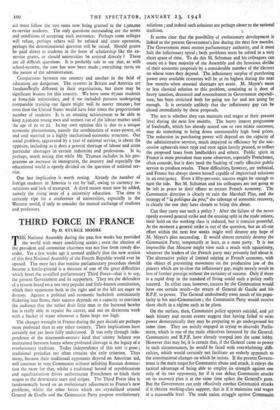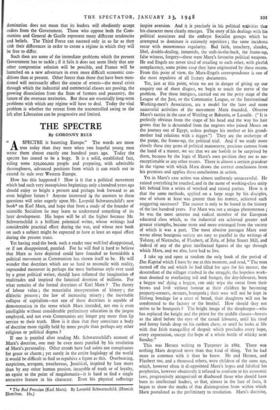THIRD FORCE IN FRANCE
By D. STURGE MOORE
The changes wrought in France during the past decade are perhaps more profound than in any other country. Their implications have certainly not yet been 'fully understood. It was only through inde- pendence of the nineteenth-century kind that unasy balance was maintained between forces whose profound cleavage is the legacy of a revolutionary tradition. Today independence of this sort is gone ; traditional prejudice too often remains the only criterion. Thus many, because their traditional opponents depend on American aid, will continue to vote Communist without relishing Russian domina- tion the more for that, whilst a traditional hatred of republicanism and equalitarianism drives authoritarian Frenchmen to hitch their wagon to the democratic stars and stripes. The Third Force idea is fundamentally based on an evolutionary adjustment to France's new problems, whilst the other forces which are crystallised around General de Gaulle and the Communist Party propose revolutionary
solutions ; and indeed such solutions are perhaps closer to the national tradition.
It seems clear that the possibility of evolutionary development is linked to the present Government's fate during the next few months. The Government must restore parliamentary authority, and it must halt the inflationary spiral ; both problems must be solved in a very short space of time. To do this M. Schuman and his colleagues can count on a bare majority of the Assembly and the ferocious dislike of their economic proposals by a considerable number of the electors on whose votes they depend. The inflationary surplus of purchasing power over available resources will he at its highest during the net few months when seasonal shortages are acute. M. Mayer's more or less classical solution to this problem, consisting as it does of heavy taxation, decontrol and retrenchment in Government expendi- ture; has been criticised both for going too far and not going far enough. It is certainly unlikely that the inflationary gap can be closed immediately by these proposals.
The test is whether they can maintain real wages at their present level during the next few months. The heavy import programme of foodstuffs, which has already scored one or two minor successes, may do something to bring down unreasonably high food prices. The reduction in purchasing power will depend on the capacity of the administrative services, much impaired in efficiency by the suc- cessive upheavals since 1939 and once again hastily pruned, to collect the proposed taxes from landholders and others. Public spirit in France is more prevalent than some observers, especially Frenchmen, often concede, but it does need the backing of really effective public service to produce results. These difficulties, however, are technical, and France has always shown herself capable of improvised solutions in an emergency. Even a fifty-per-cent. success might be enough to turn the tide. But M. Schuman and his colleagues are not going to be left in peace in their efforts to- restore French economy. The Communist directive is clearly to ruin the Marshall Plan, and the strategy of "la politique du pire," the sabotage of economic recovery, is clearly the one they have chosen to bring this about.
Can they carry out such a policy ? After the failure of the never openly avowed general strike and the ensuing split in the trade unions, their hold on the working class is reduced, but it remains powerful. At the moment a general strike is out of the question, but an all-out effort within the next few weeks might well destroy any hope of M. Mayer's plan succeeding. It would almost certainly destroy the Communist Party, temporarily at least, as a mass party. It is not impossible that Moscow might view such a result with equanimity, whatever the leaders of the French party may privately feel about it. The alternative policy of limited sniping at French economy, with the object of preventing movement on the production jaw of the pincers which are to close the inflationary gap, might merely result in loss of further prestige without the certainty of success. Only if there is a rapid drop in the standard of living could such a policy really succeed. In either case, however, success by the Communists would have one certain result—the return of General de Gaulle and his R.P.F. to power. The General undoubtedly owes much of his popu- larity to this anti-Communism ; the Communist Party would receive short shrift in a regime such as he plans.
On the surface, then, Communist policy appears suicidal, and yet both history and recent events suggest that having failed to seize power democratically they may be preparing to go, underground for some time. They are noisily engaged in trying to discredit Parlia- ment, which is one of the main objectives favoured by the General. Communists and R.P.F. have already trooped into the same lobby. However that may be, it is certain that, if the General came to power in such circumstances, he would be faced with overwhelming diffi- culties, which would certainly not facilitate an orderly approach to' the constitutional changes on which he insists. If the present Govern- ment is the main target for Communist abuse and attack, it enjoys the tactical advantage- of being able to employ its strength against one only of its two opponents, for if it can defeat Communist attacks on its recovery plan it at the same time spikes the General's guns. But the Government can only effectively combat Communist attacks if it obtains working-class support, that is if it maintains real wages at a reasonable level. The trade union struggle against Communist
domination does not mean that its leaders will obediently accept orders from the Government. Those who oppose both the Com- munists and General de Gaulle represent many different tendencies and beliefs. The Third Force can succeed only in so far as they sink their differences in order to create a regime in which they will be free to differ.
Such then are some of the immediate problems which the present Government has to tackle ; if it fails it does not seem likely that any other compromise solution will be possible, and France will be launched on a new adventure in even more difficult economic con- ditions than at present. Other forces than those that have been men- tioned will necessarily affect the course of events—the moral crisis through which the industrial and commercial classes are passing, the growing dissociation from the State of farmers and peasantry, the future of the overseas territories. But these are essentially long-term problems with which any regime will have to deal. Today the vital problem is whether the retreat from the uncontrolled swing to the left after Liberation can be progressive and limited.































 Previous page
Previous page